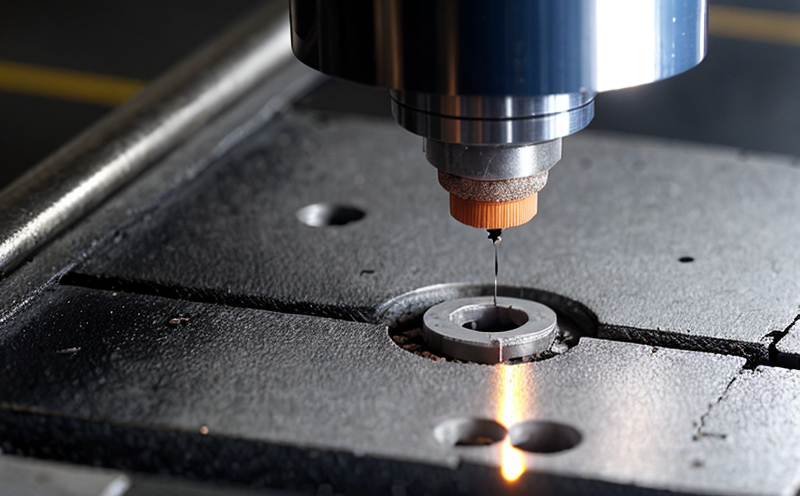JEDEC JESD22-A128 Contact Discharge ESD Failure Testing
The JEDEC Standard JESD22-A128 is a crucial guideline that defines the procedures for testing the susceptibility of semiconductor devices to electrostatic discharge (ESD) effects. This standard focuses on the contact discharge method, which simulates real-world conditions where charged objects come into direct contact with sensitive components. The JESD22-A128 test aims to ensure that microchips and other electronic components can withstand ESD events without failing or degrading their performance.
Electrostatic discharge is a significant concern in the electronics industry, especially during manufacturing, assembly, and handling processes. Excessive ESD can cause permanent damage to sensitive devices, leading to increased defect rates and higher production costs. By adhering to the JESD22-A128 standard, manufacturers can ensure that their products meet stringent quality control criteria and are reliable under real-world conditions.
The contact discharge method involves applying a controlled ESD pulse directly onto the component's metal leads or pads using a specialized probe. The test parameters include voltage levels (typically ranging from 3kV to 15kV) and the type of material used for the probe tip, which can be gold-plated copper, platinum, or other conductive materials. Proper specimen preparation is essential; this includes cleaning the component surface to remove any contaminants that could affect test results.
The instrumentation required for JESD22-A128 testing typically comprises a high-voltage generator capable of delivering the specified ESD pulses, along with a data acquisition system to record and analyze the results. The testing apparatus must be properly grounded to prevent interference from external electrical signals that could skew test outcomes.
After conducting the tests, detailed reports are generated outlining the performance characteristics of each component under various ESD conditions. These reports serve as critical quality assurance documentation for manufacturers seeking compliance with industry standards and regulatory requirements. The results can also inform R&D efforts aimed at improving product robustness against ESD.
The JESD22-A128 standard is widely recognized in the semiconductor and microchip testing sectors, making it a vital tool for ensuring component reliability. By incorporating this test into their quality control processes, companies can enhance overall product performance, reduce warranty claims, and gain competitive advantages in the marketplace.
Understanding the importance of ESD protection extends beyond just the manufacturing process to include all stages from design through final assembly. This is why JESD22-A128 testing plays a pivotal role not only for semiconductor manufacturers but also for suppliers who provide components used in various electronics applications.
Why It Matters
The reliability of electronic devices, particularly semiconductors and microchips, is paramount to their successful integration into modern technology. ESD events are a leading cause of component failure during handling or assembly processes. Ensuring that components meet the stringent requirements outlined in JESD22-A128 helps manufacturers mitigate these risks, thereby enhancing product longevity and reducing post-manufacture failures.
By adopting this testing methodology, companies can demonstrate compliance with international standards like ISO/IEC 7465-1:2009, which provides guidelines for ESD protection. This not only supports regulatory compliance but also builds trust among customers who value product integrity and durability.
The results of JESD22-A128 testing provide valuable insights into the robustness of a component under simulated real-world conditions. These insights can guide further improvements in design, material selection, and manufacturing techniques to enhance overall reliability. For quality managers and compliance officers, this data offers tangible evidence of adherence to industry best practices.
R&D engineers benefit from these tests by identifying potential weaknesses early in the development cycle, allowing for targeted enhancements that improve product performance and resilience. This proactive approach helps companies stay ahead of market trends and customer expectations, ensuring they remain competitive in a rapidly evolving technological landscape.
Industry Applications
- Consumer Electronics: Ensuring the robustness of components used in smartphones, tablets, and other consumer devices.
- Automotive Industry: Testing automotive-grade semiconductors for ESD resistance to meet stringent quality control standards.
- Medical Devices: Verifying that critical medical equipment can operate reliably even under harsh environmental conditions.
- Space Technology: Assessing the durability of components used in space exploration missions where ESD events are more prevalent due to high-energy particles and radiation.
- Data Centers: Guaranteeing the reliability of server components that handle critical data processing tasks.
The JESD22-A128 testing is integral to these applications, providing a robust foundation for ensuring product reliability across diverse industries.
Eurolab Advantages
At Eurolab, we pride ourselves on offering comprehensive semiconductor and microchip testing services that meet the highest industry standards. Our expertise in JESD22-A128 Contact Discharge ESD Failure Testing ensures accurate and reliable results every time.
We employ state-of-the-art equipment calibrated to ensure precise application of test voltages, providing consistent and repeatable results. Our highly skilled technicians are well-versed in the nuances of this testing method, ensuring thorough specimen preparation and accurate data collection.
Our commitment to quality is reflected in our stringent adherence to ISO/IEC 7465-1:2009 guidelines. This ensures that all tests conducted align with international best practices, giving you confidence in the reliability of your components.
We offer flexible testing packages tailored to meet specific client needs, whether for small batches or large-scale production runs. Our robust quality assurance protocols ensure that every test is performed meticulously and reported comprehensively.





